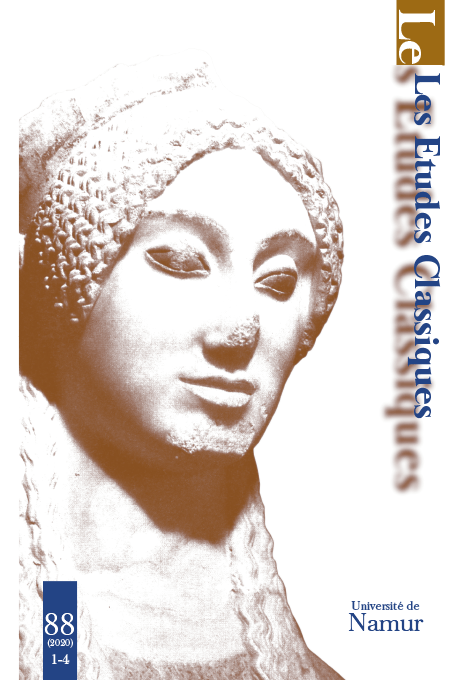 previous article in this issue previous article in this issue | next article in this issue  |

Preview first page |
Document Details : Title: The Tragic Irony of a Particle Subtitle: Agamemnon's νόστος and the Use of που in the διάπειρα Episode (Il. 2.136) Author(s): JANSE, Mark Journal: Les Études Classiques Volume: 89 Issue: 1-4 Date: 2021 Pages: 133-141 DOI: 10.2143/LEC.89.1.3290424 Abstract : This article argues that the particle που in Agamemnon’s διάπειρα is not used as a logically superfluous 'variable', as is often the case in the Homeric poems, but as an attitudinal particle which is deliberately used to underline the tragic irony of Agamemnon’s reference to the Greeks’ wives sitting around at home waiting for their husbands to return. Whereas δή and καὶ δή in the preceding lines mark the evidentiality of Agamemnon’s remark about the lapse of time and the sorry state of the ships, the use of που marks a certain uncertainty, real or feigned, about the situation at home to his audience, the assembled Greek army. For Homer, the use of που provides a subtle way of reinforcing the tragic irony inherent in Agamemnon’s reference to the wives of the Greeks, including his own wife Clytaemnestra. The particular colometry of lines 136-137 is instrumental to Homer’s highlighting of the most salient words to drive his dramatically ironicmessage home to his own audience: που, ἡμέτεραι and ποτιδέγμεναι. Dans la διάπειρα d’Agamemnon, la particule που n’est pas utilisée comme une «variable» facultative pour la logique du propos, ainsi que c’est souvent le cas dans les poèmes homériques, mais souligne à dessein l’ironie tragique de la référence d’Agamemnon aux épouses des Grecs assises à la maison et attendant le retour de leurs maris. Alors que dans l’observation qui précède sur le temps qui passe et le triste état des navires, δή et καὶ δή ont pour fonction de marquer l’évidentialité, l’emploi de που pointe ici pour les auditeurs d’Agamemnon, l’armée grecque assemblée, l’incertitude, réelle ou feinte du héros quant à sa propre situation domestique. Pour Homère, l’utilisation de που est une manière subtile de renforcer l’ironie tragique inhérente à la référence d’Agamemnon aux épouses grecques, y compris la sienne, Clytemnestre. La colométrie particulière des vers 136-137 permet à Homère de mettre en évidence les termes cruciaux rendant perceptible à son propre public l’ironie délibérée de son message: που, ἡμέτεραι et ποτιδέγμεναι. |
|


